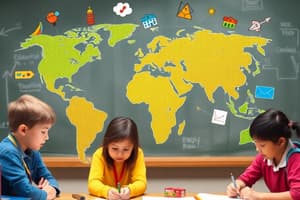Podcast
Questions and Answers
What are the key challenges in education that need to be addressed, according to the text?
What are the key challenges in education that need to be addressed, according to the text?
- Prioritizing emotional empathy, sympathy for others, and concern for social justice and human rights.
- Ensuring equal access to education and addressing the digital divide.
- Supporting teachers and giving them freedom and agency to teach creatively and collaboratively.
- All of the above (correct)
What is the primary reason for reimagining education?
What is the primary reason for reimagining education?
- To prepare students for the challenges of the 21st century, including rapid changes in the workplace. (correct)
- To promote collaboration and cooperation among students from different backgrounds.
- To train students for specific jobs in the future.
- To ensure everyone has access to digital learning resources.
What is the role of international cooperation in reimagining education?
What is the role of international cooperation in reimagining education?
- To develop a universal digital learning platform accessible to all.
- To standardize education systems across the globe.
- To expand resources for education, particularly for those in the South. (correct)
- To create a global curriculum that focuses on the needs of developing countries.
How should education be reimagined to address the challenges of the 21st century?
How should education be reimagined to address the challenges of the 21st century?
What is the main idea of a 'new social contract for education'?
What is the main idea of a 'new social contract for education'?
What is the role of future generations in reimagining education?
What is the role of future generations in reimagining education?
How should education address global challenges?
How should education address global challenges?
What is the importance of understanding and addressing the needs of all people in reimagining education?
What is the importance of understanding and addressing the needs of all people in reimagining education?
Flashcards are hidden until you start studying
Study Notes
Reimagining Education
- The current state of education is unsustainable and does not prepare students for the challenges of the 21st century.
- Education should be reimagined to focus on building skills needed for the future, particularly in the context of rapid changes in the workplace and the digital revolution.
The Importance of Education
- Education is a powerful tool for addressing global challenges such as inequality, gender inequality, and sustainability.
- Education should center around major global strategic issues such as climate change, the fourth industrial revolution, and interconnectedness.
Key Challenges in Education
- The digital divide, particularly in Africa, must be addressed to ensure equal access to education.
- Education must prioritize emotional empathy, sympathy for others, and concern for social justice and human rights.
- Teachers must be supported and given freedom and agency to teach creatively and collaboratively.
A New Social Contract for Education
- A new social contract for education is necessary to promote cooperation, solidarity, and inclusivity.
- Education should recognize and value diversity and promote learning communities that are collaborative and cooperative.
- Foreign knowledge is part of the global commons and must be protected, improved, and revised continuously.
International Cooperation and Commitment
- States and governments have a vital role to play in ensuring access to education and knowledge.
- International cooperation is necessary to expand resources for education, particularly for those in the South.
- There must be a commitment to understanding and addressing the needs of all people, regardless of their background or location.
Empowering Future Generations
- The expertise of future generations must be empowered and prioritized in any efforts to reimagine education.
- Education should prioritize ecological challenges, peace, and ensuring that no one is left behind.
Global Dialogue and Local Strategies
- Any global dialogue on education must be inclusive and collaborative, with a focus on local strategies and community engagement.
- All stakeholders must work together to realize the common good and ensure a sustainable future for all.
Reimagining Education
- The current education system is unsustainable and fails to prepare students for the challenges of the 21st century, such as rapid changes in the workplace and the digital revolution.
- Education needs to be reimagined to focus on building skills for the future.
The Importance of Education
- Education is a key tool for addressing global challenges like inequality, gender inequality, and sustainability.
- Education should focus on major global strategic issues, including climate change, the fourth industrial revolution, and interconnectedness.
Key Challenges in Education
- The digital divide, particularly in Africa, must be addressed to ensure equal access to education.
- Education should prioritize emotional empathy, sympathy for others, and concern for social justice and human rights.
- Teachers need support and freedom to teach creatively and collaboratively.
A New Social Contract for Education
- A new social contract for education is necessary to promote cooperation, solidarity, and inclusivity.
- Education should recognize and value diversity, promoting collaborative and cooperative learning communities.
- Foreign knowledge is part of the global commons and must be protected, improved, and revised continuously.
International Cooperation and Commitment
- States and governments have a vital role in ensuring access to education and knowledge.
- International cooperation is necessary to expand resources for education, particularly for those in the South.
- There must be a commitment to understanding and addressing the needs of all people, regardless of their background or location.
Empowering Future Generations
- The expertise of future generations must be empowered and prioritized in reimagining education.
- Education should prioritize ecological challenges, peace, and ensuring that no one is left behind.
Global Dialogue and Local Strategies
- Global dialogues on education must be inclusive, collaborative, and focused on local strategies and community engagement.
- All stakeholders must work together to realize the common good and ensure a sustainable future for all.
Studying That Suits You
Use AI to generate personalized quizzes and flashcards to suit your learning preferences.




